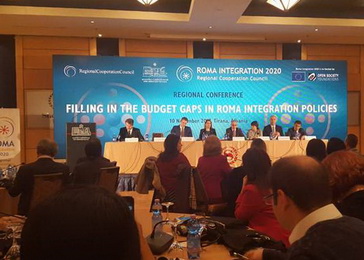 Unemployment remains the biggest problem of the Roma in the Balkan region, and according to a new survey, one in six company managers would never employ a Roma, regardless of their education and skills, as stated on 10 November at a regional conference in Tirana. The participants agreed that the situation calls for action against discrimination and for the integration of the Roma in society, and that regional cooperation is necessary to improve the lives of the Roma.
Unemployment remains the biggest problem of the Roma in the Balkan region, and according to a new survey, one in six company managers would never employ a Roma, regardless of their education and skills, as stated on 10 November at a regional conference in Tirana. The participants agreed that the situation calls for action against discrimination and for the integration of the Roma in society, and that regional cooperation is necessary to improve the lives of the Roma.
The participants at the conference of the action team of the Roma Integration 2020 project of the Regional Cooperation Council discussed the needs and priorities for filling the budget gaps in the Roma integration policies in the Balkan region and stated that integration is a long-term, complex process that requires cooperation of all stakeholders.
RCC Secretary General Goran Svilanović stated that housing and employment are key issues that they are addressing this time, adding that the goal is to provide support to the governments in the region to improve Roma integration.
Albanian Health and Social Protection Minister Ogerta Manastirliu stated that it is necessary to fight against discrimination and for the integration of the Roma into society.
Government of Serbia State Secretary Nenad Ivanišević stated that Serbia has seen a significant increase in the number of Roma children enrolling in schools, as well as in the number of students, and that there are 400 Roma students.
“About 30% of the funding is missing and it is therefore important that we talk about this. On the eve of this conference we discussed the purpose of these conferences – their purpose is to recognize that the problems are the same and that the steps in solving the problems are the same”, Ivanišević said.
Macedonian Labour and Social Policy Minister Mila Carovska stated that housing was Macedonia’s priority this year, and that the budget for this purpose had been increased. She added that the goal of the Macedonian Government was to reduce poverty in the country and consequently among ethnic minorities too.
Deputy Human Rights and Refugees Minister of BiH Predrag Jović stated that the Roma are largest and most vulnerable ethnic minority in BiH and assessed that the status of the Roma in BiH is improving day by day and he expressed his belief that this trend will continue.
The high official of Montenegrin Human and Minority Rights Ministry Leon Đogaj stated that in Montenegro “four times more Roma are integrated into the educational system” than was the case ten years ago and added that not a single highly educated Roma is unemployed. He said that the key goal of the new strategy, when the Montenegrin Roma were concerned, to reduce inequalities relative to the remaining population.
The key goal of the Tirana conference is to create an appropriate forum for the participating economies and donors to discuss the Roma integration needs and priorities, especially in the field of employment and housing.
Source: Beta, taken from www.euractiv.rs
 Government of the Republic of Serbia
Government of the Republic of Serbia















 pdf [271 KB]
pdf [271 KB]
Leave a Comment